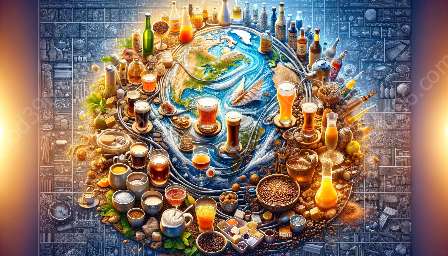Every culture and region has its own unique beverage preferences influenced by factors such as climate, tradition, and availability of ingredients. Understanding these preferences provides insights into global and regional beverage production and consumption patterns. Let's delve into the fascinating world of beverage studies and explore how varied cultural and regional preferences shape the beverages we enjoy.
Global Beverage Production and Consumption Patterns
The global beverage landscape is dynamically shaped by diverse cultures and regions. From the rich coffee traditions of Ethiopia to the tea culture in China and the wine heritage of Europe, beverages play a crucial role in defining cultural identities. These global patterns are also influenced by economic factors, trade routes, and environmental conditions.
Regional Beverage Preferences
When we explore regional beverage preferences, we encounter a myriad of choices that reflect the unique characteristics of each locale. In Latin America, for example, the love for aguas frescas, a refreshing fruit-based drink, is deeply rooted in the tropical climate and abundance of fresh produce. Meanwhile, the enduring popularity of traditional tea ceremonies in East Asia underscores the reverence for ancient customs and rituals.
Understanding Cultural Influences
Cultural influences play a pivotal role in shaping beverage preferences. In India, the consumption of spiced chai is not only a daily ritual but also a symbol of hospitality and warmth. In contrast, the vibrant café culture in Italy reflects social gatherings and the appreciation of leisurely moments over a cup of espresso. By studying these cultural nuances, we gain a deeper appreciation for the social and emotional significance of beverages.
Beverage Studies
Academic disciplines such as beverage studies delve into the rich history, cultural significance, and production techniques of beverages. Through interdisciplinary research, scholars explore how beverages connect with various aspects of society, including art, literature, and even health. Beverage studies provide a comprehensive understanding of the role of beverages in shaping cultural traditions and social interactions.
Connection with Global and Regional Production
By analyzing beverage preferences among different cultures and regions, we can draw connections to global and regional production patterns. For instance, the rising demand for matcha green tea outside of Japan has led to increased production and trade of this unique beverage. Similarly, the global popularity of craft beer has spurred innovation and growth in microbreweries across diverse regions, contributing to a rich tapestry of beverage production.
Through this exploration, we gain a deeper understanding of the interplay between cultural preferences and the global trade of beverages. Beverage studies provide valuable insights into the intricate relationships between local traditions, global commerce, and the ever-evolving landscape of beverage consumption.

